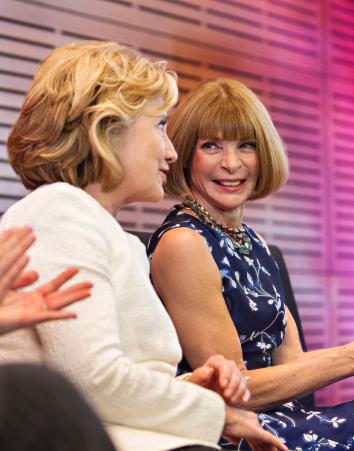This fall, several publications have made headlines with their unexpected political endorsements. USA Today had never endorsed a candidate before it came out for Clinton last month. The Atlantic’s endorsement was only its third since its founding in 1857. Several newspaper editorial boards that have long backed Republicans, including the Arizona Republic and the Cincinnati Enquirer, have also advocated for the former secretary of state. And now Clinton has racked up another surprise endorser: Vogue.
The Condé Nast fashion magazine, founded in 1892, has never made a formal endorsement for president before. But the United States has never seen this kind of presidential election before, either. Topped by a glamorous 1993 portrait of Clinton by photographer Annie Leibovitz, the unsigned editorial declares:
We understand that Clinton has not always been a perfect candidate, yet her fierce intelligence and considerable experience are reflected in policies and positions that are clear, sound, and hopeful.
She supports comprehensive immigration reform, including a path to citizenship. She speaks up for racial justice, for reforming policing and sentencing laws. Her years as Secretary of State have shown that she understands how to strengthen alliances abroad, respond to global crises, and continue American leadership in the world. She is forceful in her support for LGBTQ rights, including an end to discrimination against transgender people. She knows the challenges working women face.
Clinton has a somewhat complicated relationship with Vogue. The magazine has profiled her six times, as the endorsement notes; in 1998 she became the first presidential spouse to appear on the cover (“The Extraordinary Hillary Clinton,” the cover line read). But a decade later, in the midst of her own campaign for president, she pulled out of a profile and Annie Leibovitz photo shoot, purportedly “for fear of looking too feminine.” Editor-in-chief Anna Wintour took to her editor’s note to chastise the candidate. “The notion that a contemporary woman must look mannish in order to be taken seriously as a seeker of power is frankly dismaying,” she tut-tutted. “I do think Americans have moved on from the power-suit mentality, which served as a bridge for a generation of women to reach boardrooms filled with men.” She suggested a few suits by Carolina Herrera and Oscar de la Renta “for Senator Clinton’s consideration.”
Beginning with President Herbert Hoover’s wife, every first lady other than Bess Truman has been featured in the pages of the country’s best-known fashion magazine. Michelle Obama has now been on the cover twice. The magazine leans socially liberal in the usual Manhattan style, but it is nonpartisan in its reverence for power and wealth. That indiscriminate glamour-worship has occasionally led it into debacles like publishing Joan Juliet Buck’s glowing profile of Syrian first lady Asma al-Assad in 2011. The profile called the Assad family “wildly democratic” and enthused in its first sentence that Asma is “glamorous, young, and very chic—the freshest and most magnetic of first ladies.”
Compared with that kind of gushing, Vogue’s 400-word endorsement of Clinton reads at first like such a cautious, even dry, recommendation. But that blandness is due in part to the conspicuously quiet role that Clinton’s flamboyant opponent plays in the editorial. The Republican nominee is mentioned just once, in a parenthetical acknowledgment that the magazine has profiled his daughter and all three of his wives.
But Vogue’s Clinton endorsement is not a denunciation of you-know-who, unlike many other surprise endorsements in recent months. Instead, it is a full-throated acclamation of Clinton herself, and of the thrilling, history-making possibility that she could become our nation’s first female president. With all the justifiable hand-wringing over the possibility that we could instead be stuck with our first feces-throwing-bear president, this is downright refreshing. “Women won the vote in 1920,” the editorial reads. “It has taken nearly a century to bring us to the brink of a woman leading our country for the first time. Let’s put this election behind us and become the America we want to be: optimistic, forward-looking, and modern.” Ignoring ugliness altogether may be denial, but it is also a Vogue-worthy kind of elegance.
